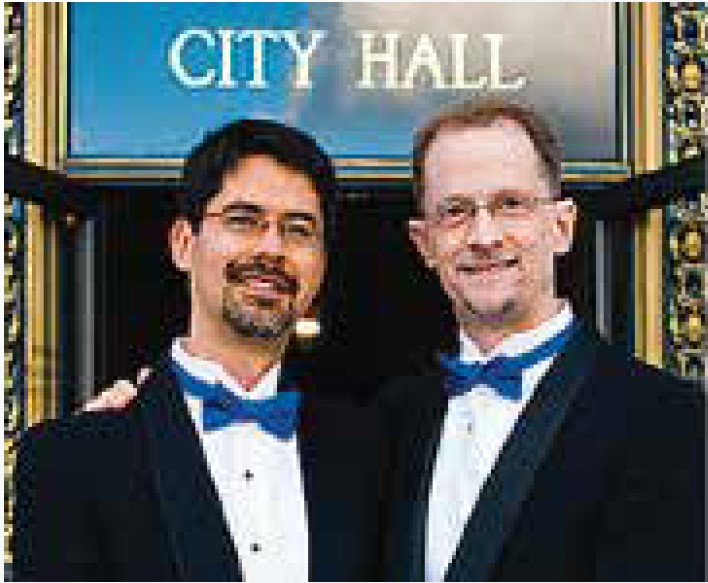
By Stuart Gaffney and John Lewis–
From 1961 to 1989, a wall divided Berlin into two cities: West and East, one capitalist and democratic, and the other Soviet-dominated. Countless people lost their lives trying to flee from East to West. Traveling both ways ourselves—from West to East and back again—in the 1980s left an indelible impression on us.
The East forced us to complete innumerable forms, account for our exact itinerary, and exchange money at a very unfavorable exchange rate. We then walked across a no-person’s land that separated the East from the West under the watchful eye of East German police officers perched in guard towers. Our return to West Berlin could not have been more different: no forms, no police presence, no one even checking passports. It felt like complete freedom, as if anyone was welcome to come.

We felt nearly that same sense of freedom two weekends ago at the spectacular Berlin LGBTIQ Pride march and celebration. On Friday night, thousands of queer women and other LGBTIQ people joined the Dyke March that ended in Kreuzberg, one of the most liberal, diverse, and queer-friendly neighborhoods in Berlin.
Then, on Saturday, countless LGBTIQ people and allies flooded the streets for the nearly 8-hour-long “Christopher Street Day” march that traversed central Berlin. When the Berlin Wall finally came down in 1989, as many people as possible poured into West Berlin as fast as humanly possible. Two weekends ago at Pride, it seemed much the same: countless people poured onto the streets of Berlin to celebrate their Pride and stand up for democracy and diversity, the themes of this year’s march.

Marchers at both events carried homemade signs with messages such as: “Queers gegen Rechts” (Queers against the Far Right), “Be Brave Like Ukraine,” “Chinese Queers Will Not Be Censored,” “Marching for Those Who Can’t,” and “Make the Middle East Nonbinary Again!” We were proud of the U.S. Embassy’s Pride motto: “Unsere Botschaft heisst Liebe” (Our Embassy’s Message Is Love).
The march ended with a festival that stretched half the length of “June 17 Street” (commemorating the June 17, 1953, uprising against the East German government) to the iconic Brandenburg Gate where the Berlin Wall used to separate East from West. Overlooking it all was the Reichstag, the seat of the German government, with a large Rainbow Flag flying atop.

Even though the march featured numerous colorfully decorated double-decker buses blaring queer dance music at top volume and many marchers dressed in very expressive attire, a friend explained to us that the march was at its core a demonstration and not a parade. This year’s march theme emphasized that we are “only strong together” if we embrace “democracy and diversity.” March organizers and multiple individual floats warned against “the dangers of right-wing groups and parties” and called for supporting diversity on many levels including race, national origin, and LGBTIQ identities.
The march itself embodied that sense of welcome. No barrier divided marchers from spectators. Anyone could join any contingent at any time. Participants came from all across Europe and around the world, including places where being yourself as an LGBTIQ person is very difficult: Russia, Hungary, and China, to name just a few. For part of the time, we marched with Plus Golos, an international group of LGBTIQ-supportive parents and loved ones who support their LGBTIQ friends and family members from Armenia, Belarus, Germany, Georgia, Moldova, Russia, and Ukraine.
As we wrote in the last issue of the San Francisco Bay Times, Berlin was the birthplace of the modern LGBTIQ rights movement back in 1897.

Christopher Street Day began in Berlin 45 years ago in 1979, and the organizers’ choice of that name links the modern queer rights movement in Germany to the movement in New York City, the U.S., and indeed around the world.
Berlin Pride’s 2024 message that democracy and diversity are vital to our strength, well-being, and sense of togetherness is just as relevant in the U.S., across Europe, and in the rest of the world as it is in Germany. Just as countless queer people took to the streets of Berlin for Pride, millions and millions of Americans must stand up and be counted in November to preserve democracy and our strength and diversity as a nation.
John Lewis and Stuart Gaffney, together for over three decades, were plaintiffs in the California case for equal marriage rights decided by the California Supreme Court in 2008. Their leadership in the grassroots organization Marriage Equality USA contributed in 2015 to making same-sex marriage legal nationwide.
6/26 and Beyond
Published on August 8, 2024
Recent Comments